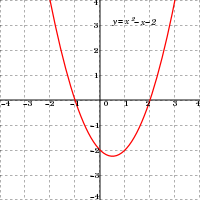
Elementary algebra, also known as college algebra,[1] encompasses the basic concepts of algebra. It is often contrasted with arithmetic: arithmetic deals with specified numbers,[2] whilst algebra introduces variables (quantities without fixed values).[3]
This use of variables entails use of algebraic notation and an understanding of the general rules of the operations introduced in arithmetic: addition, subtraction, multiplication, division, etc. Unlike abstract algebra, elementary algebra is not concerned with algebraic structures outside the realm of real and complex numbers.
It is typically taught to secondary school students and at introductory college level in the United States,[4] and builds on their understanding of arithmetic. The use of variables to denote quantities allows general relationships between quantities to be formally and concisely expressed, and thus enables solving a broader scope of problems. Many quantitative relationships in science and mathematics are expressed as algebraic equations.
- ^ Pierce, R., College Algebra, Maths is Fun, accessed 28 August 2023
- ^ H.E. Slaught and N.J. Lennes, Elementary algebra, Publ. Allyn and Bacon, 1915, page 1 (republished by Forgotten Books)
- ^ Lewis Hirsch, Arthur Goodman, Understanding Elementary Algebra With Geometry: A Course for College Students, Publisher: Cengage Learning, 2005, ISBN 0534999727, 9780534999728, 654 pages, page 2
- ^ Cite error: The named reference
leffwas invoked but never defined (see the help page).



